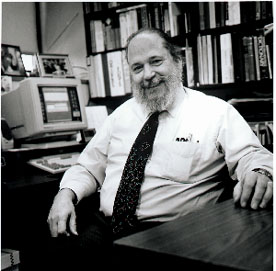
Professor John Harriman
I have been a chemist since I was eleven years old growing up in the small steel mill town of Girard, Ohio. Chemistry sets, supplemented by chemicals that my father's drugist friend could help me acquire as well as others I bought from major chemical suppliers through the mail, allowed me to experiment making compounds with unusual (to me) smells, colors, and explosive properties. Not surprisingly, my early experiments gave rise to several house fires and other accidents; fortunately, my parents were tolerant enough to allow me to continue, after I had served appropriate penance time without my chemicals. While in high school, I had two outstanding teachers who also encouraged me. Mr. Herb Cramer, our chemistry and physics teacher, gave me a job (for no pay) in his science lab prep room making up solutions for use in our class experiments; this access allowed me to further explore how chemicals behaved. Ms. Helen Ebinger, our math teacher, met me before school began in the morning to teach me subjects that our school was not able to offer in its regular curriculum. To these two early teachers, I owe a great deal of thanks.
In these early days, I enjoyed simply making things but, as time went by, I became more interested in what made these compounds behave as they did. When I began college, I soon undertook a research project on the far infrared vibrational spectra of salts such as (Bu)4 N+ Br- in solvents where they existed primarily as associated ion pairs rather than as dissociated solvated ions. The work was carried out under the supervision of Prof. Gordon Barrow, an experimental spectroscopist at Case Institute of Technology (which merged with Western Reserve University in the year I graduated,1967) who has authored widely used textbooks in physical and introductory chemistry.
Before long, I found myself reading and learning more about the theory of molecular vibrations and solvent effects on these vibrations. Papers by Professors George Pimentel of Berkeley and Peter Debye of Cornell especially excited me. Once I learned that vibrations are described by a potential energy surface on which the molecule's nuclei oscillate, I began to try to "cook up" one- dimensional potentials on which two masses (i.e., the positive and negative ions' masses) could oscillate in a manner that would agree with the experimental far IR spectra I had gathered for various ion pairs and various solvents. This was my first foray into theoretical chemistry.
Knowing that Prof. Barrow wanted someone who would keep his nose to the grindstone gathering far IR data, and realizing that my own interests lie in trying to figure out what equations governed the motions and behavior of atoms and molecules, I decided to find a faculty member whose interests were more along the lines of my own. I discovered that Prof. Don Whitman had such interests, so I signed up to pursue undergraduate research under his guidance. At this time, I also learned that Prof. Whitman's research area was called theoretical chemistry. From that time on, I identified myself as a theoretical chemist. As my work with Whitman on single-center expansion methods in configuration interaction and on quantum scattering cross-sections progressed, I saw that I needed to know a lot more math than I did. So, I enrolled in advanced calculus, complex variables, ordinary and partial differential equations, numerical analysis, and mathematical physics to strengthen my background. While at Case, I also took graduate level classes in statistical mechanics, quantum chemistry, and classical dynamics to further enhance my knowledge.
After earning a B.S. degree in chemistry, I entered the Ph. D. program at the University of Wisconsin's Theoretical Chemistry Institute (TCI) where I worked with Profs. John Harriman

Professor John Harriman
and Joeseph O. Hirschfelder. The education provided in TCI was very rigorous and involved taking four semesters of quantum chemistry, two of statistical mechanics, a year of physics electrodynamics, three semesters of physics quantum mechanics, a semester of inorganic chemistry theory, and three semsters of group theory from the mathematics department.
After earning a Ph. D. degree at Wisconsin, I spent a year at M.I.T. doing postdoctoral work in statistical mechanics under Profs. John Deutch and Irwin Oppenheim, where I met a large number of Ph. D. students and postdocs who were also specializing in theoretical chemistry.
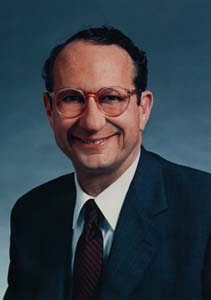
Professor John Deutch
Durng 1971, I applied for academic positions in chemistry departments at several high quality universities. Because of its excellent reputation in physical chemistry, and because Professors Henry Eyring and Frank Harris
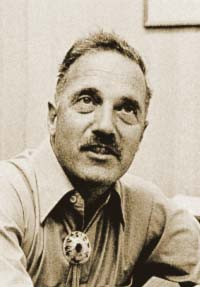
Professor Frank Harris
were in its Chemistry Department, I joined the faculty at
The University of Utah
where I have pursued my entire career to
date (below, I show a photo taken from the deck of my home in Utah-
it should help explain why I so much like to live here- as well as
two photos of hiking trips I took with Utah Chem. Dept. friends into
the Uinta
Mountains
of northeast Utah and the
Wind
River Mountains
of northwest Wyoming). I also show a
recent photo of the members of our Henry Eyring Center for
Theoretical Chemistry.

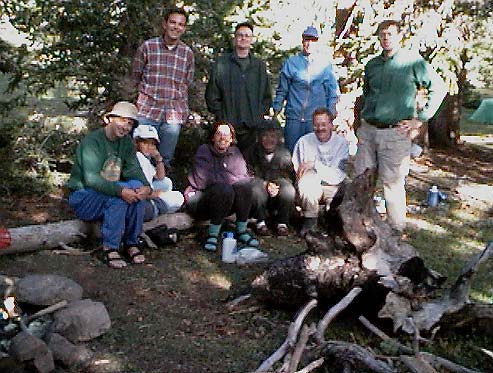
Some Utah Chemistry People in the Uinta Mountains

Where Utah Chemistry People Camped in the Wind River Mountains
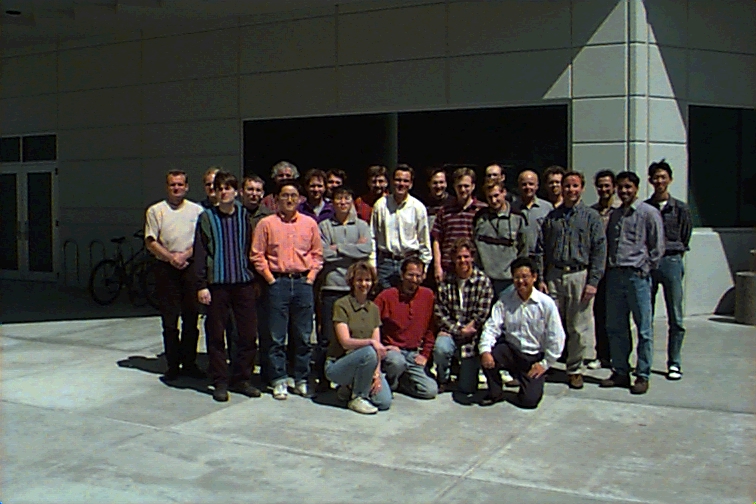
Members of the Henry Eyring Center for Theoretical Chemistry (some are missing because they were out of town) in 1999.
During more than twenty-five years teaching and pursuing research at Utah, I have never lost my interest in theory nor regretted pursuing this line of scholarship. As the years have gone by, I have become even more convinced that the discipline of theoretical chemistry provides a very powerful set of tools for understanding (and even predicting) the behavior of molecules and materials. It also provides a very broad and flexible educational framework from which to understand other scientists' seminars and publications. It is very infrequent that I can not follow a seminar in any area of chemistry once I have cut through the jargon and discovered how the molecules' behavior relates to the topic being discussed. It is this power to understand at a fundamental level how atoms and molecules behave that excites me so much about doing theoretical chemistry. Especially in the present era of more and more specialization in science research and education (e.g., biological chemistry students are often not required to take classes in molecular spectroscopy or chemical dynamics, physical chemistry students often learn either "gas-phase" or "condensed-phase" subjects but not both and usually know little about biological chemistry, and organometallic researchers view themselves as neither inorganic nor organic), I believe theory offers a wider breadth of knowledge that is healthy for a significant fraction of practicing chemists to possess.
I am pleased that I decided to study this broad and empowering sub-discipline of chemistry. I hope, by reading these web pages and exploring some of the web site links provided, that readers will see the great breadth, power, and impact of theory on understanding the world around us.